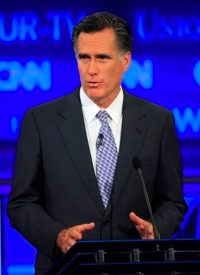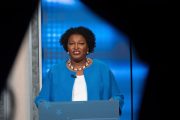
“We’re not that far apart on all the big issues,” former Godfather’s Pizza CEO Herman Cain said at the end of the debate, which was almost entirely devoid of specific numbers of what to cut and where to cut. Among the candidates who proposed cuts in spending to balance the budget, only Representative Ron Paul of Texas proposed any specific cuts (other than ObamaCare): “I argue the case that this money ought to be cut out of foreign welfare, and foreign militarism, and corporate welfare, and the military industrial complex. Then we might have enough money to tide people over.”
All of the candidates declined to go into attack mode against presumed frontrunner, former Massachusetts Governor Mitt Romney, who leads in most polls. Former Minnesota Governor Tim Pawlenty failed to go after Romney on the Massachusetts healthcare plan Romney sponsored as Governor just days after labeling it “Obomneycare” in a Fox News Sunday discussion. Former Pennsylvania Senator Rick Santorum also failed to take advantage of a question on Romney’s election year conversion to pro-life back in 2008. It’s hard to tell if the GOP rivals are preparing the path for Romney as the anointed leader, or if they’re ignoring him as a political dead man for inspiring ObamaCare and creating the political reality of the individual healthcare mandate.
Mitt Romney delivered the most obvious falsehood of the night in a reply to a question about why his Massachusetts healthcare mandate was different from ObamaCare’s national mandate. Romney claimed that ObamaCare “raises $500 billion in taxes. We didn’t raise taxes in Massachusetts.” Actually, Romney proposed a tax increase for anyone who doesn’t buy health insurance under RomneyCare. This year, $1,212 will be added onto the income tax bill of the uninsured in Massachusetts because of RomneyCare, a figure that will triple in coming years.
Regarding Romney’s record on taxes in general, as Governor he disguised his tax increases as increases in “fees,” proposing some 70 fee increases in his first year as governor that totaled more than $500 million.
WMUR, the local New Hampshire television station that sponsored the station along with CNN, featured an “instant response” system that measured the reaction of people in the audience (and several satellite audiences) positive or negative to candidates’ statements in the debate. Former Godfather’s Pizza CEO Herman Cain and Representative Ron Paul of Texas were the only two candidates with consistent favorables over the 70 percent range while they spoke, though they followed a very different pattern. Cain’s statements moved almost instantly into the 80-90 percent range, while Paul’s favorables followed a very gradual progression. Cain’s one-liners were clearly quick crowd-pleasers, but the longer Paul talked the higher his favorables rose.
Paul has claimed in recent weeks that the American people are increasingly coming around to his point-of-view because of the economy. “The malinvestment in the bubbles are caused by the Federal Reserve and the government, and we keep propping it up,” Paul argued during the debate. “It was predictable it would come. It’s predictable it’s lasted three years. And it’s predictable, as long as we do what we’re doing in Washington, it’s going to last another 10 years.” Paul’s record on the economic predictions is uncanny, as he accurately diagnosed the housing and banking bubble as early as 2001 in speeches before the U.S. House of Representatives.
By way of contrast, Cain a former Federal Reserve Bank of St. Louis chairman called the housing bubble a media fiction in 2005:
You could write a book just on how poor the coverage has been of the alleged housing bubble. The media have been foretelling a massive bust in housing prices for months now. On May 19, ABCs Elizabeth Vargas said: The run up in housing prices is now beginning to look something like the boom in Internet stocks, and we know what happened there. That kind of ignorance makes homeowners fear that their most expensive possession could turn worthless overnight. That won’t happen. No matter how much the media compared Bush to Herbert Hoover last year, this is not the Great Depression.
Minnesota Representative Michele Bachmann who formally announced her candidacy during the debate won some fans with fiscal conservatives by stressing her history of opposing the 2008 TARP bank bailout bill:
I was behind closed doors with [Bush’s] Secretary Paulson when he came and made the extraordinary, never-before-made request to Congress: Give us a $700 billion blank check with no strings attached.
And I fought behind closed doors against my own party on TARP. It was a wrong vote then. It’s continued to be a wrong vote since then. Sometimes that’s what you have to do. You have to take principle over your party.
Representative Ron Paul also vigorously opposed the TARP bailout, while Mitt Romney and Herman Cain backed the TARP bank bailout bill along with then-Senator Obama.
The debate didn’t discuss foreign relations until the final minutes of the event, and most of the Republicans talked about less foreign military involvement. “It’s time to bring our troops home as soon as we possibly can,” Romney replied to a question about the U.S. troop commitment in Afghanistan, adding, “consistent with the word that comes to our generals that we can hand the country over to the [Afghanistan] military in a way that they’re able to defend themselves.”
Representative Paul countered:
I wouldn’t wait for my generals. I’m the commander in chief. I make the decisions. I tell the generals what to do. I’d bring them home as quickly as possible. And I would get them out of Iraq as well. And I wouldn’t start a war in Libya. I’d quit bombing Yemen. And I’d quit bombing Pakistan.
The seven candidates who debated were Mitt Romney, Ron Paul, Tim Pawlenty, former House Speaker Newt Gingrich, Michele Bachmann, Herman Cain, and Rick Santorum. Former New Mexico Governor Gary Johnson was excluded from the debate under the rationale of low polling numbers.
Photo of Mitt Romney: AP Images



